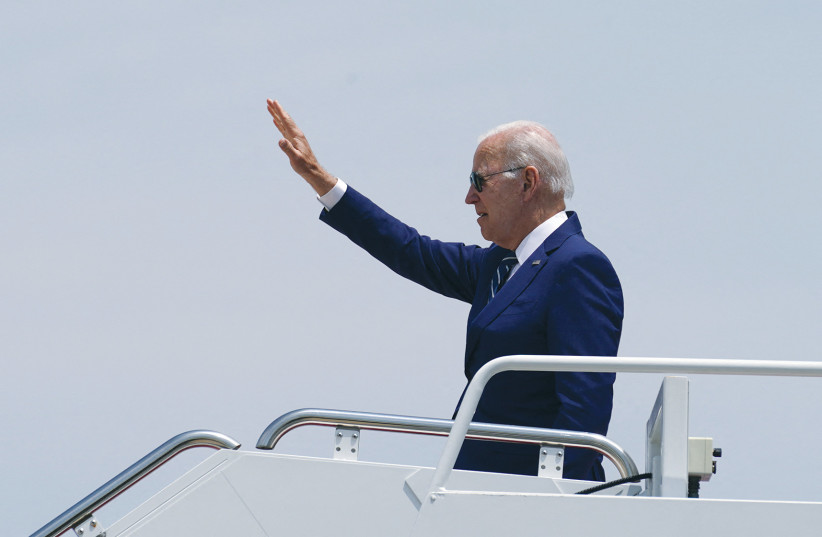Despite the turmoil, uncertainty and instability caused by the current political crisis in Jerusalem, it’s encouraging that US President Joe Biden is still planning to visit Israel next month.
Biden’s trip to the region – scheduled for July 13-16 and including visits to the Palestinian Authority and Saudi Arabia – had already been postponed by a month, due to domestic considerations. Back then, the Biden administration expected to be meeting with Prime Minister Naftali Bennett, who visited the White House once as prime minister last August.
With the process of dissolving the Knesset and declaring new elections well underway, it wouldn’t have been surprising for the White House to decide to postpone the July trip. All indications are that Biden will be greeted in Jerusalem by caretaker prime minister Yair Lapid who would serve as Israel’s leader until the next elections, likely in October.
However, as a National Security Council spokesperson said this week, “Israel is a strategic partner and fellow democracy. We respect its democratic processes. We have a strategic relationship with Israel that goes beyond any one government. The president looks forward to the visit next month.”

Former US ambassador to Israel Daniel Shapiro told The Jerusalem Post’s Omri Nahmias on Tuesday that the impending Israeli election will have little impact on the substance of Biden’s visit.
“The agenda is the same agenda. He’ll still focus on promoting Israel’s integration in the region, building on the Abraham Accords; US-Israel security cooperation, linked to a broader regional coalition; improving the atmosphere with the Palestinians; and preparing for the next phase of dealing with Iran, with or without a nuclear deal,” said Shapiro.
One reason that Biden isn’t likely to cancel the trip has less to do with Israel and more to do with Saudi Arabia. As Herb Keinon wrote last week, if holding discussions in Israel with Israeli leaders were the main purpose of the trip – rather than repairing the fractured ties with the Saudis – Biden would probably postpone until the current political crisis passes.
Lucy Kurtzer-Ellenbogen, the director of the Israeli-Palestinian conflict program at the US Institute of Peace, agreed that Saudi Arabia and the GCC [Gulf Cooperation Council] convening is the centerpiece of the trip.
“However, heading to the Middle East for the first time in his presidency, skipping Israel would not be an option for Biden given the significance and closeness of the relationship between the two countries, and Biden’s own longstanding commitment to the US-Israel alliance,” Kurtzer-Ellenbogen told Nahmias.
Biden’s close historic ties with Israel are undoubtedly part of his reason for visiting. However, the long-term strategic significance of the Israel-US relationship is larger than any president or prime minister. If only to demonstrate that with action, it’s a smart decision to keep the trip in place while giving due deference to Israel’s democratic process.
That’s where things could get a little gnarly, with Israel’s messy democratic process. Biden must be careful not to fall into any partisan traps that may be set out for him for vested interests on both the Right and the Left in Israel’s political makeup.
It’s important that Biden’s visit and the numerous photo ops that will accompany it not be maneuvered and twisted into being seen as an endorsement of a party leader running in the election in the hopes of forming the next government.
It’s highly unlikely that any major statements or policy changes will be announced in regard to Israel and the Palestinians during the visit, especially given the uncertainty of Israel’s future leadership. Instead, the goal of both the Americans and the Israelis will be to strengthen the broad and deep relationship and avoid anything controversial that would entail significant diplomatic maneuvers.
Refraining from influencing Israel’s internal politics as the country prepares to go to its fifth election in three years should be a major objective of the Biden visit. If that goal is met, and the emphasis remains on the vast and vital non-partisan ties that Israel and the US share, then the trip will be a success. It’s always good to welcome a friend, especially one who cares about Israel as much as Biden.
